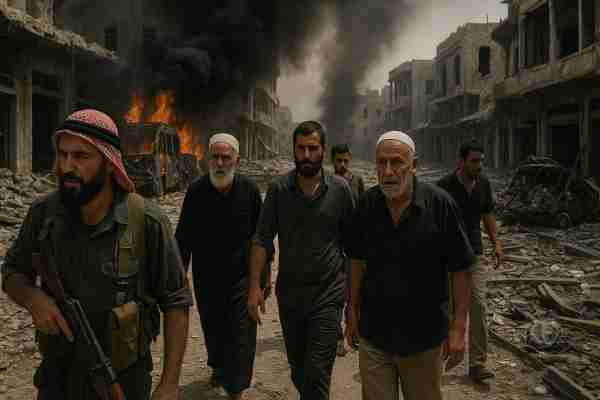July 2025. Southern Syria is once again on the brink of a full-scale ethnic and religious conflict. The ancient city of Suwayda, at the foot of Syria’s Jabal al-Druze Mountains, has erupted in violence that has left more than a hundred people dead in a matter of days. In a region where Druze, Sunnis, and Bedouins have lived side by side for centuries, the latest wave of violence is the bloodiest in recent years. It all began on July 13. Sunni Bedouins roaming the outskirts of Suwayda kidnapped a young Druze man named Ayad Abu Shakra, accusing him of alleged crimes against one of their clan. The Druze responded quickly. Armed groups, including members of the Jabal Self-Defense and fighters from the Fahd al-Hurr movement, carried out retaliatory raids within hours, capturing Bedouin and blocking roads leading to Suwayda. The next day, the area was in chaos. On July 14, government forces entered the city. They were supposed to restore order, but things turned out differently. The troops, including the 15th Division of the Syrian Army, encountered resistance from the Druze, who suspected the government of supporting Bedouin militias. Fierce fighting began, with machine guns, mortars and snipers. Houses burned in the streets, and central squares turned into battlefields. Syrian soldiers occupied a number of government buildings, but suffered heavy losses - at least 93 soldiers were killed or wounded, according to the Syrian Observatory for Human Rights (SOHR). Meanwhile, the Druze were trying to maintain their autonomy and control over the city. Mosques and churches were filled with calls to defend the homeland and ancestors. Elders were asked for advice, and young people took up arms. On July 15, Syrian Defense Minister Murhaf Abu Qasra arrived in the region and announced a “complete ceasefire.” The deal was reached with the help of local leaders, representatives of the Druze community, and some Bedouin clans. However, the truce proved shaky. Just a few hours after the announcement, government soldiers raided several neighborhoods, accusing residents of harboring militants. Cases of extrajudicial executions, disappearances, and looting were recorded. An additional dimension to the conflict was added by the international reaction. Israel, which is closely monitoring the situation of the Druze, carried out two airstrikes on Syrian army columns near Sueida and Daraa. The targets were ammunition depots and convoys heading to the city. The Israeli government said the action was aimed at protecting the Druze from possible genocide and preventing Iranian influence in the region. For several days, the situation remained volatile. The streets of Sueida were empty. Shops were closed, mosques were crowded, hospitals were overflowing with the wounded. The death toll exceeded 160 people. Among them were not only fighters, but also women, children, and the elderly. Relatives were unable to collect the bodies, and buried their loved ones in the courtyards of houses, under bullets. This crisis was yet another reminder of how fragile peace remains in Syria. The conflict in Sueida is not just a local quarrel between clans. It is the result of decades of political manipulation, violence, lack of trust and the interference of external players. In the city once known as the "city of brothers", silence reigned in July 2025. Not the silence of peace - the silence after gunfire.
Gunpowder in the Shadow of the Mountains: A Chronicle of Bloody July in Suwayda

Published : 16.07.2025
